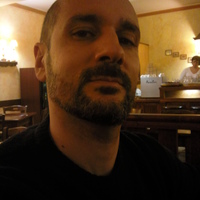
Sorin Paliga
Linguist, historian of religions and cultures, translator
Address: University of Bucharest, Dept. of Russian and Slavic Philology
https://unibuc.ro/user/sorin.paliga/?lang=en
Address: University of Bucharest, Dept. of Russian and Slavic Philology
https://unibuc.ro/user/sorin.paliga/?lang=en
less
Related Authors
Nerissa Russell
Cornell University
Massimo Leone
Università degli Studi di Torino
Emir O. Filipović
University of Sarajevo, Faculty of Philosophy
Alejandra B Osorio
Wellesley College
David Seamon
Kansas State University
Maria Cristina La Rocca
Università degli Studi di Padova
Louis de Saussure
University of Neuchâtel
Armando Marques-Guedes
UNL - New University of Lisbon
Jacques Chiffoleau
EHESS-Ecole des hautes études en sciences sociales
Lorenzo Verderame
Università degli Studi "La Sapienza" di Roma
InterestsView All (21)










Uploads
Papers by Sorin Paliga
As the paper reflects author's analyses and hypotheses published over years on several occasions, it also sums up author's views and results, in an attempt towards an ample work dedicated to ethnicity.
As the paper reflects author's analyses and hypotheses published over years on several occasions, it also sums up author's views and results, in an attempt towards an ample work dedicated to ethnicity.
https://www.meteorpress.ro/carti/mitologia-tracilor-2.html
The complex linguistic stratification of southeast Europe is illustrated in tens and hundreds of examples showing the Pre-Indo-European, Indo-European (Thracian), Latin, and Slavic heritage, as well as other influences, e.g., Hungarian and Turkish (Ottoman). The etymology of Romanian is a critical and sometimes controversial subject, but I'm hoping it will provide a solid and trustworthy resource for information.
The actual dictionary is preceded by a lengthy, yet hopefully not tedious, introduction. Its goal is to explain the complicated problems of Romanian etymology. It is followed by a list of prehistoric roots reflected in the heritage of Romanian.
I would like to thank all those who have supported this ambitious project over the years.
The dictionary may be ordered in printed form or as ebook:
https://www.peterlang.com/document/1309431
Sorin Paliga is linguist and slavist, and co-author Eugen Silviu Teodor is an archaeologist, specialized in the period of migrations of southeast Europe.
It is also the only book published under a nom de plume, Jonathan Walsh. It belongs to the history of the English literature, right?
This is the PDF version. The printed original is dated 1993.
The other three minor lexicons refer to the situation of the velar spirant in Romanian, to the basic 100 Slavic roots and a glossary of Lithuanian mythological terms (in Romanian).
Crăciun is the only case when a substratum element is preserved as a Christian term (just like Yule or Easter in English, or Ceppo in Italian). The verb mântui, and its derivatives, has been assigned to the Hungarian influence. A careful analysis of the words as well as the comparison with the beliefs in the magic hands shows that the most probable origin is the evolution of manu tueor ‘to save by hand’, which initially was a medical term, connected to the magic hands of a doctor. It was later used in connection with Jesus’ magic hands.
As Machek notes, ‘fire’ must have had peculiar meanings in prehistoric and protohistoric societies, mainly with those ethnic groups which practised cremation as a normal burial rite, and perhaps on other occasions, where fire had its essential role, for exmple, the fires burning around the period of the winter solstice, as still preserved in the long period from (now) December 21st to January 6th, as witnessed in syntagmas like Bulgarian bădni večer = Serbian badni veće = Albanian nata e buzmit ‘the night of the logs’, that is, ‘the night when fires were burning everywhere’ = the period of the winter solstice, now Christmas Eve.
Less known is the peculiar situation of Romanian pururi, now used as an adverb with the basic meaning ‘eternally, for ever’, also as de-a pururi, with the same meaning. The etymology is, despite its being mentioned as ‘unknown’ in the current dictionaries, limpid clear: the plural of an initial form *pur ‘fire’, neuter plural pururi (pur-uri). The modern meaning ‘eternally’ is, beyond any doubt, derived from ‘eternal fires’.
Key words. Sacred fire, cremation, burial rites, god of fire.
Hungarian, or rather substratum elements in Romanian?
The Hungarian and Romanian versions, unpublished, are uploaded here for convenience, in an attempt to show the meandering ways of the linguistic analysis, and for a larger debate.
The discussion refers to the recently published etymological dictionary of Romanian (Peter Lang, 2024)